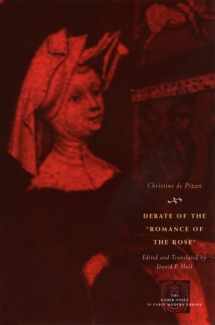
Debate of the Romance of the Rose (The Other Voice in Early Modern Europe)
ISBN-13:
9780226670126
ISBN-10:
0226670120
Author:
Christine de Pizan
Publication date:
2010
Publisher:
University of Chicago Press
Format:
Hardcover
384 pages
Category:
Women Writers
,
Women's Studies
FREE US shipping
Book details
ISBN-13:
9780226670126
ISBN-10:
0226670120
Author:
Christine de Pizan
Publication date:
2010
Publisher:
University of Chicago Press
Format:
Hardcover
384 pages
Category:
Women Writers
,
Women's Studies
Summary
Debate of the Romance of the Rose (The Other Voice in Early Modern Europe) (ISBN-13: 9780226670126 and ISBN-10: 0226670120), written by authors
Christine de Pizan, was published by University of Chicago Press in 2010.
With an overall rating of 4.5 stars, it's a notable title among other
Women Writers
(Women's Studies) books. You can easily purchase or rent Debate of the Romance of the Rose (The Other Voice in Early Modern Europe) (Hardcover) from BooksRun,
along with many other new and used
Women Writers
books
and textbooks.
And, if you're looking to sell your copy, our current buyback offer is $0.3.
Description
In 1401, Christine de Pizan (1365–1430?), one of the most renowned and prolific woman writers of the Middle Ages, wrote a letter to the provost of Lille criticizing the highly popular and widely read Romance of the Rose for its blatant and unwarranted misogynistic depictions of women. The debate that ensued, over not only the merits of the treatise but also of the place of women in society, started Europe on the long path to gender parity. Pizan’s criticism sparked a continent-wide discussion of issues that is still alive today in disputes about art and morality, especially the civic responsibility of a writer or artist for the works he or she produces. In Debate of the “Romance of the Rose,” David Hult collects, along with the debate documents themselves, letters, sermons, and excerpts from other works of Pizan, including one from City of Ladies—her major defense of women and their rights—that give context to this debate. Here, Pizan’s supporters and detractors are heard alongside her own formidable, protofeminist voice. The resulting volume affords a rare look at the way people read and thought about literature in the period immediately preceding the era of print.


We would LOVE it if you could help us and other readers by reviewing the book
Book review

Congratulations! We have received your book review.
{user}
{createdAt}
by {truncated_author}


